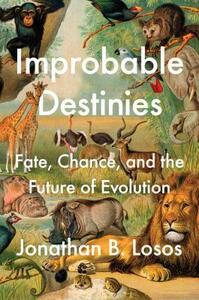Take a photo of a barcode or cover
A little dry at times, but utterly fascinating for anyone interested in evolutionary biology. It even ended up with speculation about what aliens might look like based on the ideas and studies presented in the book. This sci-fi writer approves!
funny
informative
inspiring
medium-paced
informative
reflective
relaxing
slow-paced
Absolutely fantastic and engrossing read about the predictability of evolutionary biology. This is one of those books that makes you think, had I read it at an earlier age, it might have changed what I did at university. Very well written and Losos really pulls you along. Science nonfiction has to walk a very fine line between dry and overly simplistic, and this does it admirably.
challenging
informative
inspiring
reflective
slow-paced
I really enjoyed the theoretical concepts brought about in this book. It questions a lot of preconceived notions about evolution and how life formed on Earth. Very interesting scientific read that is digestible enough for non-scientists, but may be a bit dense at times.
This is one of the better pop-science books I've read. Losos does a great job explaining many different scientific experiments and how they fit into broader theories of evolution. I appreciated that nothing was overly-dumbed down or one-sided. Losos presents a variety of conflicting but not always mutually exclusive ideas that provide nuance to his ultimate argument about the predictability and repeatability of evolution. The book was full of evidence, yet did not feel like a list as some pop-science books I've read have been. Overall an enjoyable, engaging, and informative read.
informative
inspiring
medium-paced
3.5/5 - I am rating this as a semi-knowledgeable but ultimately lay person perspective. This book was really interesting and provided points or examples I had never heard of and I thought the premise was an intriguing one. I think the author makes their point well (that although evolution can be predictable in the short term, it is an enigma on the large scale). However, some examples became so technical I found myself zoning out. This from the perspective I mention earlier reduced the rating on this, however, if I was assigned this for a college or graduate level course, this wouldn’t hurt it.
It is a very well written, engaging, mostly accessible, and informative book on a very difficult topic. Overall I would recommend to the biology and/or evolution nerd.
It is a very well written, engaging, mostly accessible, and informative book on a very difficult topic. Overall I would recommend to the biology and/or evolution nerd.
I didn't know how common convergent evolution is - lots of interesting examples, but got repetitive.
Using accessible language and an entertaining style, Improbably Destinies explores the ways evolutionary biology is studied and tested. It doesn't introduce too much information at once but builds upon itself to create a coherent picture of the studies and theories that lead to what is now known about evolution, and the reasoning behind predictions about further evolution on this planet and possibilities of life beyond it.





